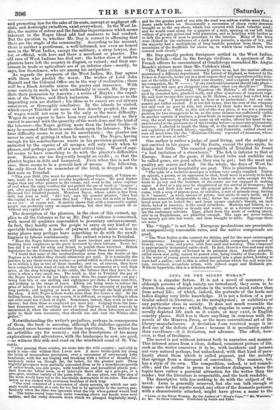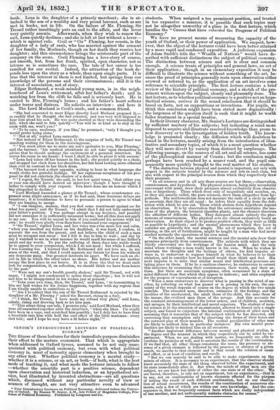LENA. OR THE SILENT WOMAN. * Tilts is a singular fiction.
It is not a novel of manners ; for although persons of high society are introduced, they seem to be drawn from some abstract notions in the writer's mind rather than from actual life ; of which, indeed, the portraits of the lords and lathes display very little knowledge. It is not a fiction of a par- ticular school in literature, as the metaphysical ; or exhibitive of any particular class in society. It does not much resemble the writer's former works ; which, though singular in some points, ge- nerally depicted life such as it exists, or may exist, m English country places. Still less is there anything in common with the novels of the Minerva Press, or the mere conventional art of the library-manufacturers. A deviation fiom received usage is in- deed one of the defects of Lena ; because it is peculiarity rather than excellence—it is deviation, not advance. The effect, how- ever, is that of freshness.
The novel is not without interest both in narrative and manner. This interest arises from a clear, defined, consistent picture of life, such as the writer conceives it to be, with incidents and persons not very natural perhaps, but unhacknied, with that kind of pecu- liarity about them which is called piquant, and the novelty that springs from a disregard of convention. The manner, too, has a style of its own. The composition, indeed, is not remark- able ; and the author is prone to wiredraw dialogues, where the topics have rather a parental attraction for the writer than the reader ; but the literature ie respectable, and the book readable. The descriptive title has nothing to do with the subject of the novel. Lena is generally reserved, but she can talk enough at times : save for the mystic sound, any other of the dramatis personae, with a characteristic attached, might have given a name to the
• Lena, or the Silent Woman. By the Author of "Ring's Cope," " Mr. Warenne," &c. In three volumes. Published by Smith and Elder. book. Lena is the daughter of a princely merchant; she is at- tached to the son of a wealthy and very proud baronet, such as are met in books, not in life. On the failure of Mr. Fleming, Sir Tressel rather insultingly puts an end to the affair, and the lover very quietly assents.' Afterwards, when they wish to renew the suit, Lena quietly declines ; and she is left at last without a lover— which is against rule. Cecil or " Cis " Fleming, her cousin, is the daughter of a lady of rank, who has married against the consent of her family, the If °Hands' though on her death they receive her daughter; and this circumstance brings the aristocratic part of the company on the scene. Cecil Fleming has a love-story of course, not smooth, but, from her frank, spirited, open character, not so intense as is sometimes the case. The tale of her career is too ramified for our recital. Indeed, the attraction of the book de- pends less upon the story as a whole, than upon single parts. It is true that the interest in them is not limited, but springs from our knowledge of the persons and their circumstances; still it is the interest of association, not of story.
Edgar Rothmond, a weak-minded young man, is in the neigh- bourhood of Lena's retirement, after her father's death ; and in watching her from the cliffs he falls and is seriously hurt. He is carried to Mrs. Fleming's house ; and his father's heart softens under terror and distress. He solicits an interview : and here it is. The Lord Morland is Cecil's uncle, and a common friend.
"She had consented to meet Edgar directly Lord Morland proposed it,— so readily that he thought she had relented, and was very well disposed to hear him plead his suit. He was quite startled as they were descending the hill, when she said to him quietly—' You will be so kind as to stay in the room with me, won't you ? '
"'To be sure, madonna, if you like,' ho promised ; 'only I thought you would prefer being alone.' " Not at all,' replied Lena earnestly. "But instead of Edgar Rothmond, to the surprise of both, Sir Tressel was standing waiting for them in the drawingroom.
" ' You must allow me to make my son's apologies to you, Miss Fleming; said the baronet: his medical attendants do not take upon themselves% advise that he should undergo the excitement of a personal interview. He leaves his cause in my hands : I trust I shall be able to plead it with success.'
"Lena had taken off her bonnet in the hall; she passed quietly to a chair, and dropped her cloak from her shoulders, her fair head looking more ethereal than ever in contrast to her black dress.
"The baronet took a chair opposite, waiting to hear in what language she would clothe her grateful feelings. Of her rapturous acceptance of his pro- posal he did not entertain the shadow of a doubt. " I regret, Sir Tressel,' she said, in her low quiet tones, that either you or your son should have desired an interview ; though I have thought it better to comply with your request. You have done me an honour which I beg altogether to decline.'
"Lord Morland hazarded a glance at Sir Tressel; whose countenance ex- pressed some alight annoyance, as if he had said, these feminine delays are vexatious ; it is troublesome to have to persuade a person to agree to what they are longing to accept.
" I can imagine, madam, that you feel some resentment against me for what has passed,' said Sir Tressel. 'I admit that I did not fully understand your father's position. I was perhaps abrupt in my decision, and possibly did not announce it in sufficiently measured terms; but all this does not apply to my son. You will be unjust to him if you confound his actions with my own : he would very gladly even then have continued your engagement.'
" ' Sir Tressel,' replied Lena, and her voice was even more low and calm, when you insulted my father on his deathbed, it was hard, I confess, to separate the son from the parent, and not believe the child of such a man must be arrogant and mean : but I felt it due to him to wait ; and day by day I watched to see in what manner he would mark his sense of my father's merit and my worth. To put the suffering of those days into words would be to appeal to your compassion, which I do not need : but while I suffered, I was learning too. I learned that Mr. Rothmond did not love me, in my sense of the word, and that I could separate my future lot from his without any desperate pang. Our greatest interests lie apart. We have each an ob- ject in life in which the other takes no share. His father and my mother occupy the first place in our hearts. It is in these ties that we must each look for compensation, if, on reflection, we should think we have been losers by the past.'
4
" Were not my son's health greatly shaken,' said Sir Tressel, red with anger ' I might not condescend to notice these objections ; but it will not suit him to be disappointed in his wishes just at present.'
" Take your own time, then, Sir Tressel,' said Lena, in transmitting to him my beat wishes for his future happiness, together with my regrets that I am totally unable to contribute to it.'
" Am I to collect that the son of Sir Tressel Rothmond is rejected by the daughter of a Mr. Fleming ?' asked the Baronet, rising in a fury. " I think, Sir Tressel, I have made my refusal very plain,' said Lena, calmly, rising and drawing back to let him pass. "'This silent thing can talk, I promise you,' said Lord Morland, when they were all assembled together after the interview, ' when she likes. Cis might have been in a rage, and scratched him possibly ; but I defy her to have fired a broadside into him with half the cool effect of the little madonna : every shot told; and I hope he may have a fit before night.' "



























 Previous page
Previous page